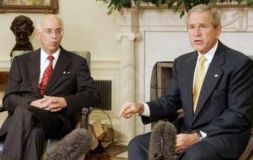US Bush mulls over new plan to end Darfur violence
Oct 31, 2006 (WASHINGTON) — President George W. Bush said on Tuesday the United States was looking at new ways to stop the violence in Darfur after getting a “grim” report about the humanitarian crisis from his special envoy.
 “The United States is going to work with the international community to come up with a single plan on how to address this issue and save lives,” Bush said after meeting envoy Andrew Natsios, who spent 10 days in Sudan this month.
“The United States is going to work with the international community to come up with a single plan on how to address this issue and save lives,” Bush said after meeting envoy Andrew Natsios, who spent 10 days in Sudan this month.
“He came back with a grim report,” Bush said. “The people who have suffered there need to know that the United States will work with others to help solve the problem. And the government of Sudan must understand that we’re serious.”
The Darfur conflict erupted in February 2003, when non-Arab rebels took up arms against the Sudanese government. In response, the government mobilized Arab militias known as Janjaweed, who have been accused of murder, rape and looting.
An estimated 200,000 have been killed and 2.5 million forced to flee their homes during violence that has included rape, killing and looting.
Although it declared more than two years ago that genocide had occurred in Darfur, the United States has been unable to stop the violence or to persuade the government to accept a U.N. peace-keeping force of up to 22,500 troops and police.
Bush, and a spokesman for British Prime Minister Tony Blair, both suggested they were looking at what more they can do but provided few details on how they might influence the Khartoum government.
“We are reaching the crunch point. It’s important that the Sudanese government be in no doubt at all of our seriousness,” Blair’s spokesman said after the British prime minister met Sudanese Vice President Salva Kiir in London.
A Sudanese official repeated his government’s rejection of a U.N. force, which is designed to replace a 7,000-strong African Union contingent that lacks funding and equipment.
“An attempt to bring in the U.N. forces which is not agreed upon by the parties in Darfur will exacerbate the situation,” Mohamed Yusif Abdallah, Sudan’s minister for culture, youth and sports, said in Geneva.
State Department spokesman Sean McCormack acknowledged the U.S. has been unable to persuade Sudan to accept a U.N. force and said “we are taking a look at … what new or different policy proposals we might make.”
Foreign policy analysts called on the United States to take more muscular steps to pressure Khartoum.
John Prendergast of the International Crisis Group urged the Bush administration to pursue “punitive actions.” These might include U.N. sanctions against Sudanese businesses linked to the leadership and gathering more intelligence to identify, and ultimately prosecute, those within the government who may be responsible for atrocities.
“The policy has been one of strong rhetoric and no action,” Prendergast said, saying Washington has resisted punitive steps for fear of jeopardizing counter-terrorism cooperation.
Susan Rice, a former U.S. assistant secretary of state for African affairs now at the Brookings Institution think tank, proposed U.N.-authorized military action such as airstrikes or a blockade to slow the flow of Sudan’s oil.
“We have got to get (rid of) this notion of negotiating with the perpetrators of genocide as to whether we are going to be able to stop it. It is morally bankrupt and it is doomed to fail,” Rice said.
(Reuters)
